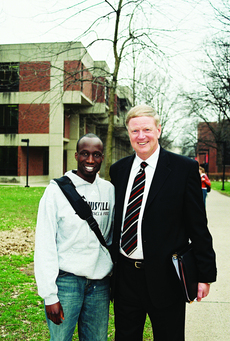After months of a rumored 12 percent tuition increase, University of Louisville President Dr. James R. Ramsey announced plans for a 9.9-percent hike for the 2007-08 academic year.
The increase, which amounts to about $313 more in tuition and fees, still requires final approval by the U of L Board of Trustees and the Kentucky Council on Post-Secondary Education later this semester.
Ramsey made the announcement last Tuesday at a tuition forum in the Student Activities Center’s Floyd Theatre. Ramsey, along with U of L Provost Shirley Willihnganz and Vice President of Finance Michael Curtin, discussed the university’s plans to control tuition and fielded questions from students.
About 40 students attended the discussion.
“We are a big campus and it’s hard to reach out to students,” Ramsey said. “The turnout was disappointing.” The forum was advertised to students through e-mails and campus posters for several weeks before the event.
“It disturbs me that the [university] president sets time aside to meet with students, and so few attend,” said freshman Kaden Jacobs, a history major.
“This sends the message that students are not truly concerned with tuition and that the University of Louisville can continue on its path of raising tuition every year,” Jacobs said.
If approved, the tuition increase will generate an estimated $14.4 million more a year in revenue for the university.
Ramsey said around $8.74 million of the increase will go directly toward student initiatives, however university officials explained that funding increases in other areas as a result of the tuition increase will also benefit students.
According to Ramsey, approximately $3.1 million of the $8.74 million, for example, will fund student financial aid programs such as the Cardinal Covenant, a new scholarship program for underprivileged U of L students, which is estimated to cost $350,000 its first year.
Ramsey also said the increase will help U of L accomplish its goal to become a premiere metropolitan research institution: about $3.5 million more is set to go toward research.
About $2 million of the $3.5 million will be used for hiring new faculty members. Ramsey also said, “Our graduate teaching assistant program hasn’t been competitive enough. We want to get the stipend levels up for our [graduate teaching assistants].”
The talk about expenditures also had students inquiring about the university’s efforts to cut spending.
“We owe it to you to show you how we are cutting costs. We’ve had energy audits and closed some programs,” Ramsey said. “I even cut the president staff from 11 people to 7 people.”
University administrators also answered other campus concerns not directly related to tuition. They discussed familiar issues like parking, campus beautification and food services.
“We are trying to be aggressive in land acquisition for parking,” Ramsey said. He reassured students that the university was doing everything it could to provide more suitable parking for commuters.
Addressing campus beautification, Willihnganz said, “A lot of the new landscaping that is going in with the flowers and shrubs is paid for with donations and grants.”
Ramsey also responded to student complaints about the few food services offered on campus.
There is not enough traffic to support the type of food services students want, Ramsey said.
However, he cited the renovation of Stansbury Park as a more feasible option for food services with extended hours.
Sophomore political science major Jonathan Brown said, “Students need to hold the administration accountable to their promises.”






